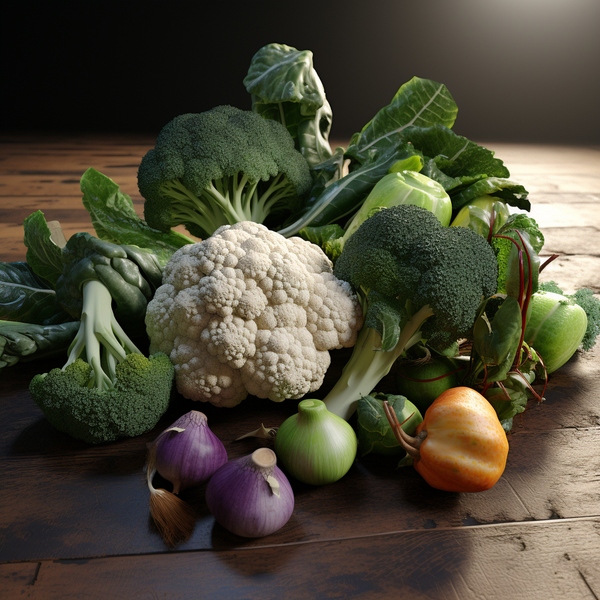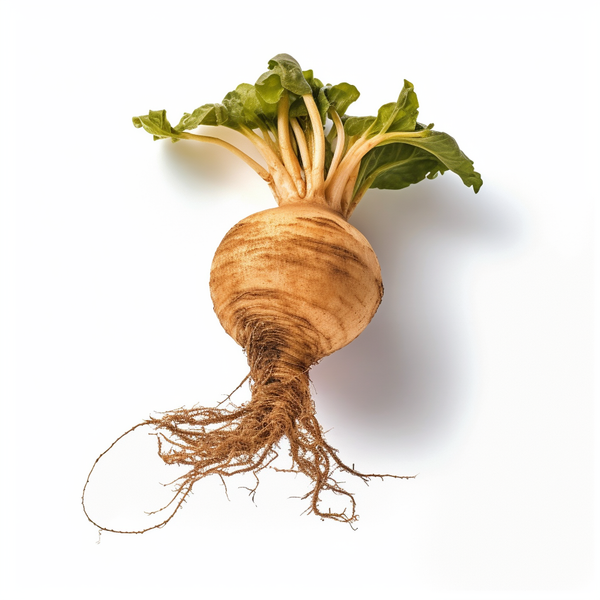Maca root, renowned for centuries as the "Peruvian ginseng," offers an extensive array of potential health benefits, making it an essential staple in the wellness community. Sourced from the harsh terrains of the Andean plateaus, maca has not only sustained indigenous communities nutritionally but also medicinally.

Maca Root: A Brief Introduction
Maca (Lepidium meyenii) is a cruciferous vegetable, sharing familial ties with broccoli, cauliflower, cabbage, and kale. With its origins tracing back to the lofty Andes mountains of Peru, this root has been an integral part of the Andean diet and medicine for over 2,000 years. Surviving elevations exceeding 13,000 feet, maca's resilience is a testament to its robust nutrient profile.

Nutritional Composition
Maca boasts an impressive nutritional portfolio, including:
- Fiber
- Essential vitamins and minerals
- Alkaloids
- Glucosinolates
- Macamides and macaridine
These components contribute to the root's proposed health benefits and its global popularity as a supplement.

Potential Benefits of Maca Root
1. Sexual Health and Fertility
While research is still ongoing, some studies suggest that maca may play a pivotal role in enhancing sexual function in both males and females:
-
Males: Preliminary research has shown potential improvements in libido and semen concentration in those consuming maca. Moreover, the synergy of maca with Chinese chive seed has demonstrated improved erectile functionality in animal models.
-
Females: A specific study noted that women experiencing reduced sexual function due to antidepressant usage witnessed significant improvements upon consuming 3,000 mg of maca daily for 12 weeks.
2. Menopausal Relief
Maca could be a beacon of hope for those navigating the challenges of menopause. Initial studies indicate that it might alleviate distressing symptoms like hot flashes and disturbed sleep patterns.
3. Energy and Mood Enhancement
Maca could potentially serve as a natural mood enhancer and energy booster. Several studies on varying populations, from mice to humans residing at diverse altitudes, have observed mood and energy elevation upon maca consumption. Its potential in regulating exercise-induced fatigue underscores its prominence in athletic communities.
4. Further Health Implications
Animal studies have unveiled several promising health benefits:
- Preservation of cognitive functions
- Potential alleviation of benign prostatic hyperplasia (BPH)
- Enhanced wound healing
- Anti-inflammatory properties
- Improved nutrient digestion
While these findings are groundbreaking, it's crucial to await human studies for definitive conclusions.

Safety and Consumption of Maca
Generally, maca is safe for consumption in culinary quantities. When used as a supplement, up to 3 grams per day for four months has been observed to be safe. However, as with any supplement, always ensure product authenticity and seek advice from a qualified healthcare professional, especially if pregnant or nursing.
For culinary enthusiasts, maca powder seamlessly integrates into diverse dishes, enriching smoothies, oatmeal, baked items, and energy bars with its distinct nutty flavor reminiscent of butterscotch.

Conclusion
Maca root's multi-dimensional health offerings make it an intriguing subject for further scientific exploration. While its current evidence-based benefits are promising, it's essential to approach maca supplementation under expert guidance.

Frequently Asked Questions About Maca Root
Q1: What is maca root, and where does it come from?
Maca (Lepidium meyenii) is a cruciferous vegetable originating from the Andes mountains of Peru. It has been a fundamental component of the Andean diet and medicine for over 2,000 years, often referred to as the "Peruvian ginseng."
Q2: What nutritional components are found in maca root?
Maca contains a diverse nutritional portfolio, which includes fiber, essential vitamins and minerals, alkaloids, glucosinolates, as well as macamides and macaridine.
Q3: How might maca root benefit sexual health and fertility?
Research suggests that maca may enhance sexual function in both genders. For males, it's linked to potential improvements in libido and semen concentration, and in combination with Chinese chive seed, it may improve erectile functionality. For females, a study showed that taking 3,000 mg of maca daily for 12 weeks can significantly improve sexual function, especially in those with reduced sexual function due to antidepressant usage.
Q4: Are there any health benefits of maca root related to menopause or mood enhancement?
Yes. Initial studies indicate that maca might alleviate some menopausal symptoms, such as hot flashes and sleep disturbances. Moreover, it has the potential to act as a natural mood enhancer and energy booster, with studies observing elevated mood and energy levels in both animals and humans upon maca consumption.
Q5: Is maca root safe to consume and how can it be integrated into one's diet?
Maca is generally safe for consumption in culinary quantities. As a supplement, up to 3 grams per day for four months is considered safe. However, consulting a healthcare professional is recommended, especially for pregnant or nursing individuals. Culinary-wise, maca powder can be added to various dishes, enhancing foods like smoothies, oatmeal, baked items, and energy bars with its unique nutty flavor.

Disclaimer
The information provided in this article is intended for the Australian audience and is for educational and informational purposes only. It should not be interpreted as medical advice or instruction. While efforts have been made to ensure the accuracy and authenticity of the data presented, readers in Australia are strongly advised to consult with a registered healthcare professional within the country before making any decisions regarding the consumption or use of maca root or any supplements. Individual responses to supplements can vary, and the potential benefits mentioned herein are grounded in preliminary research. Always ensure compliance with Australian health and regulatory standards.
Referance
- NIH:PUB MED National Library of Medicine - Maca
- NIH:PUB MED National Library of Medicine - maca improve Seminal

